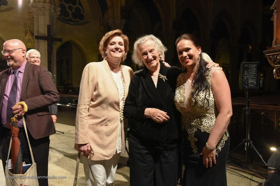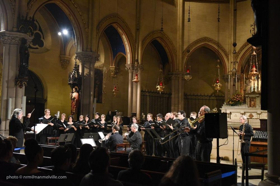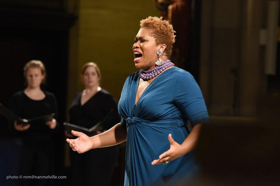Review: Works Old and New Show THEA MUSGRAVE Still the Life of the Party

Ashley Putnam and Jenny Sandelin.
Photo: Nan Melville
Now into her 10th decade, the venerable composer Thea Musgrave is still full-steam ahead.
The Scottish-born musician has lived in the US for over 40 years, and her works are not nearly as well known as they should be, judging from arias and other compositions heard at her 90th birthday concert last night (May 27) in New York, where she lives. And what a concert it was at the Church St. Mary the Virgin. The New York Virtuosi Singers under Harold Rosenbaum showcased all Musgrave, all the time, with two world premieres, two US premieres and a couple of NY premieres in the two-hour concert.
(See my interview with La Musgrave.)
The major piece--in length and themes--was "The Voice of our Ancestors," a 2014 commission from the John Armitrage Trust in the UK and only now venturing "across the pond." On paper, it looks as if it might simply be a group of songs, about "love, loss and drinking," but the hearing turns it into one flowing piece that forms a sheet of sounds and thoughts that envelops the listener.

Voices of our Ancestors. Photo: Nan Melville
From the opening that pairs a bass trombone (John D. Rojak) and organ (James Adams), adding a pair of trumpets (Kevin Cobb and Louis Hanzlik) and then the chorus, I found the music, with its sometime, subtle shift to minor, enthralling. It brings together ancient texts hand-picked by Musgrave--from Arabic, Persian, Hebrew, Latin, Greek, Egyptian and Chinese sources (all in English)--and marshalls the resources of the Virtuosi Singers' chorus and soloists, expressive narrator Tadeusz von Moltke, the American Brass Quintet and organ.
Kilt-clad oboist Nicholas Daniel arrived to "reclaim Thea for Scotland." In less time than it took to reset the stage, he played a pair of short, but meaty, pieces written for him, "Dawn" and "Whirlwind"--music that flew out of the oboe, like glitter being strewn by a magician, mixing glissandos and staccato. Daniel commended the composer for understanding that music "should feel good to play"; that feeling is passed along to the audience.
Musgrave's addition to the British choral tradition was "Rorate coeli (Drop down, ye heavens...)," based on a pair of poems by another Scot, William Dunbar. But make no mistake: there is nothing medieval about her writing here, as she proves that modern and beautiful can be synonymous. This piece for unaccompanied chorus (first performed by the Thomas Tallis choir) is expressive in telling of the nativity and resurrection and proved choral forces need not be large to make a big impression.
Providing a bridge between the composer's choral/instrumental pieces and the opera excerpts that closed the program was the world premiere of "La vida es sueno (Life is a dream)," a dramatic monologue taken from the Calderon play of the same name. While I found the delivery by baritone Jose Adan Perez falling perhaps a bit too forcefully on the ear, the music for piano was quite freeform and enchanting, with its arpeggios and glissandos, and wonderfully played by Michael Fennelly.
Three of Musgrave's operas were represented, all with strong music for strong women, and taut story-telling in the librettos by the composer.
The first, from SIMON BOLIVAR (a subject suggested to Musgrave by Placido Domingo), was sung by soprano Jenny Sandelin. She conjured a vivid, soaring portrait of Bolivar's married mistress, about to leave home to be at the dying conqueror's side.

Photo: Nan Melville
Next was an excerpt from Musgrave's telling of the story of Harriet Tubman and the underground railroad, "HARRIET, THE WOMAN CALLED MOSES," jointly commissioned by the Virginia Opera (where her husband, Peter Mark, was founder and general director) and the Royal Opera, Covent Garden. Mezzo Karmesha Peake was riveting as Tubman's mother, Rit, using her velvety voice to excellent effect, with soprano Christine Lyons poignant as the young Harriet and bass Martin Fisher as her father.
The last part of the printed program was the Monologue and Ensemble from Musgrave's best known work in these parts (and the only of her operas staged in NY), MARY, QUEEN OF SCOTS. It was introduced by Ashley Putnam, who sang the title role in the US and NY premieres of the work; though her singing days are past, she gave a powerful reading from the libretto. Soprano Sandelin was splendid in the monologue, using her richly dramatic instrument to bring the queen to life and the Virtuoso Singers providing excellent choral support. Baritone Jose Adan Perez as James and bass Steven Moore as Gordon led sturdy support.
The evening ended with a "surprise" addition: Stravinsky's improvisational version of "Happy Birthday," which was written to celebrate the 80th birthday of conductor Pierre Monteux. I guess that they could have used Musgrave's own variation, written as part of a set to celebrate the 70th birthday of William Schumann, but, hey, a little Stravinsky did quite nicely.
Reader Reviews

Videos

